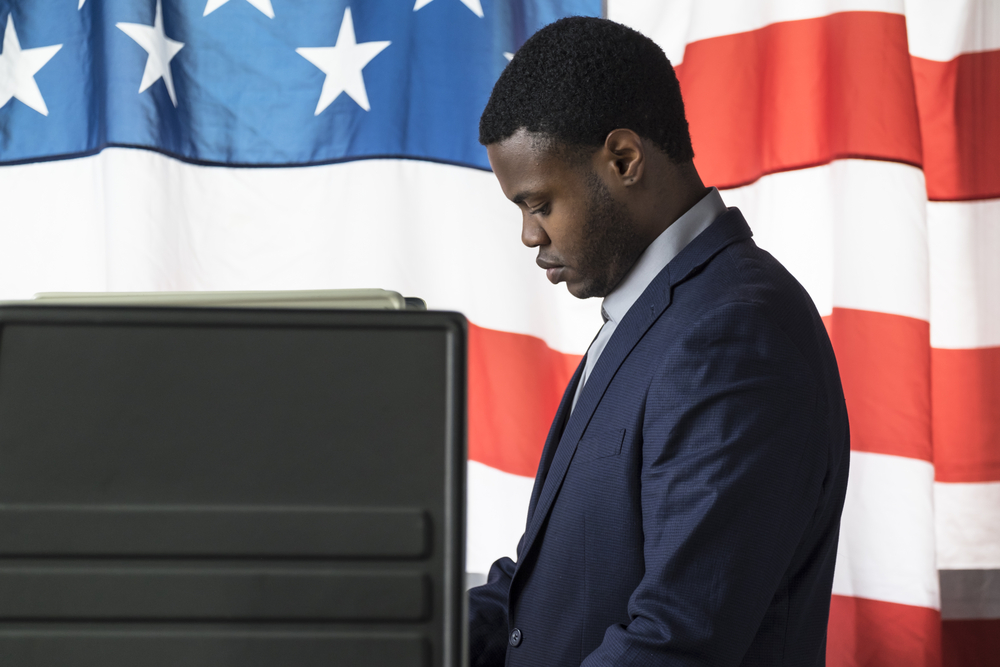
Burlingham/Shutterstock
.
2018 has already been another year of tension in cities across the country between police officers and young black males.
The headlines of these incidents never seem to cease. In March, officers in Sacramento, Calif., opened fired and killed Stephon Clark for standing in his own backyard holding a cellphone. Then in April, Brooklyn police officers shot and killed Saheed Vassel, an unarmed black man with mental disabilities when they mistakenly mistook the pipe he was holding for a gun.
For more information on Racial-Ethnic Fairness, go to JJIE Resource Hub | Racial-Ethnic Fairness
Philadelphia police officers arrested Rashon Nelson and Donte Robinson in Starbucks in April for simply sitting in the store and waiting for their business partner for a meeting. And in May, a young black man, Anthony Wall — dressed in a tuxedo after having just taken his little sister to prom — was seen in a viral video getting choked by a police officer in Warsaw, N.C. at a Waffle House.
In what couldn't be more timely, actor Donald Glover, who has also goes by the musical stage name "Childish Gambino," has topped musical charts with a new hit single, "This is America," where he explores artistically what it means to currently be black in America. The video has been described by New Yorker Magazine as "a powerful portrait of black-American existentialism, a powerful indictment of a culture that circulates videos of black children dying as easily as it does videos of black children dancing in parking lots.”
This all happened in merely the beginning of the year and after a horrible 2017. There were only 14 days in all of last year that police did not kill someone. According to Mapping Police Violence, which released its 2017 Police Violence Report at the end of December, police killed 1,147 people. This is two dozen more than were killed in 2016 by police. Officers were only charged with a crime in 1 percent of all cases. And of the 1,147 people officers killed, 25 percent were black — despite blacks being just 13 percent of the U.S. population.
We still have hope
So far this year 466 people have been killed at the hands of law enforcement.
While this news sounds bleak, we are not without hope and have the power to implement change.
All this occurs during a major election year and at a time when we have the opportunity to use the power of our votes to right some of the societal ills we are witnessing. Local law enforcement is demonstrating it is time for a shift. This November on ballots across the country we will have the opportunity to create change in our local municipalities by looking down the ballot. The "smaller" races matter just as much as the big races do. Three out of four people in local courtrooms — the local district attorneys, sheriffs and judges — are elected. Elections present a great opportunity to help change the narrative about our young people who come in contact with the law.
Additionally, asking questions about youth justice and police officer use of force at town halls and of those running for office is a great opportunity to get candidates on the record about issues that directly impact young men of color.
We can also run for office — and some of us are stepping up to do just that.
Scrutiny of shootings by those charged to protect and serve began after Michael Brown, an unarmed black teenager from Ferguson, Mo., was fatally shot by a white police officer in August 2014. The death of the 18-year-old sparked widespread protests, and prompted a White House commission to call for reforms, as well as galvanized the Black Lives Matter movement and led many police agencies across the nation to examine their use of deadly force.
Four years later, Michael Brown's mother, Lezley McSpadden, says she is considering running for Ferguson’s City Council. Since the death of her son, the protests have prompted her to step up to try to change how black Americans are treated by law enforcement, she said.
She is to be applauded for turning tragedy into hope. We all can join her and ensure our voices are heard by voting and supporting quality candidates for office who will hold our local criminal justice systems accountable and implement fair and equitable practices toward young black men.
Young black men need our help in standing up and speaking out against these continued injustices.
Aprill O. Turner is communications director for the Campaign for Youth Justice, a national initiative focused entirely on ending the practice of prosecuting, sentencing and incarcerating youth under the age of 18 in the adult criminal justice system.